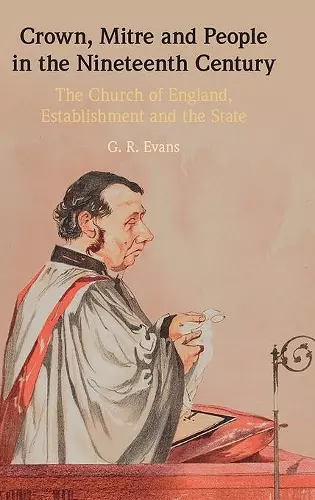Crown, Mitre and People in the Nineteenth Century
The Church of England, Establishment and the State
Format:Hardback
Publisher:Cambridge University Press
Published:23rd Sep '21
Currently unavailable, and unfortunately no date known when it will be back

Disestablishment remains a controversial subject. Evans shows how Church and State in the nineteenth century led to fractious modern debate.
The Church of England has its own courts and its own laws, subject to the law of England. In the nineteenth century, as Professor Evans shows, its jurisdiction was rethought in a flurry of Parliamentary interest, press coverage and high-profile cases involving colourful clergy and laity and much social pressure.Throughout the nineteenth century the relationship between the State and the Established Church of England engaged Parliament, the Church, the courts and – to an increasing degree – the people. During this period, the spectre of Disestablishment periodically loomed over these debates, in the cause – as Trollope put it – of 'the renewal of inquiry as to the connection which exists between the Crown and the Mitre'. As our own twenty-first century gathers pace, Disestablishment has still not materialised: though a very different kind of dynamic between Church and State has anyway come into being in England. Professor Evans here tells the stories of the controversies which have made such change possible – including the revival of Convocation, the Church's own parliament – as well as the many memorable characters involved. The author's lively narrative includes much valuable material about key areas of ecclesiastical law that is of relevance to the future Church of England.
'This is a very stimulating reflection on church-state relations in nineteenth-century England by a very distinguished scholar. I am confident that it will be of enormous interest to scholars and practitioners of ecclesiastical law not only in the Church of England but beyond to Anglicans more widely and indeed to historians of the free churches. The study is also richly documented (the author's use of the records of debate in Parliament and in Convocation is superb), and it contains a host of examples which indicate the hugely personal elements of the wider story. The writing style is very cultured - it is also tight and lucid. I have very much enjoyed reading the book, which I found fascinating, refreshingly novel and very thought-provoking.' Norman Doe, Cardiff University
'Gillian Evans' study deals with a topic of undoubted significance and is undergirded by significant amount of research. It will be of interest to scholars of nineteenth century history, church historians, ecclesiastical lawyers and those interested in the future direction of the Church of England.' Frances Knight, University of Nottingham
'This is a very stimulating reflection on church-state relations in nineteenth-century England by a very distinguished scholar. I have very much enjoyed reading the book, which I found fascinating, refreshingly novel and very thought-provoking.' Norman Doe, Cardiff University
'Gillian Evans' study will be of interest to scholars of nineteenth century history, church historians, ecclesiastical lawyers and those interested in the future direction of the Church of England.' Frances Knight, University of Nottingham
'This book will interest any who wish to know what one historian has called 'the profoundly Anglican and often clerical culture of the early nineteenth century' that shaped Newman … It also provides a mine of information for professional historians …' Benjamin J. King, Newman Studies Journal
ISBN: 9781316515976
Dimensions: 235mm x 158mm x 22mm
Weight: 690g
350 pages